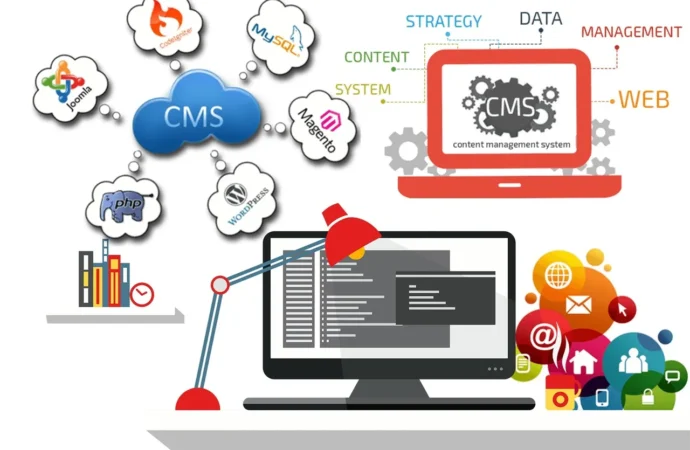In today’s fast-paced digital environment, businesses depend on seamless collaboration between marketing and development teams to deliver customer-centric digital experiences. Yet, too often, these teams operate in silos, each relying on its own tools, processes, and goals. Marketing may prioritize speed, campaigns, and content, while developers focus on scalability, system architecture, and long-term stability. This
In today’s fast-paced digital environment, businesses depend on seamless collaboration between marketing and development teams to deliver customer-centric digital experiences. Yet, too often, these teams operate in silos, each relying on its own tools, processes, and goals. Marketing may prioritize speed, campaigns, and content, while developers focus on scalability, system architecture, and long-term stability.
This disconnect frequently leads to delays, miscommunication, and missed opportunities. A well-integrated content management system (CMS) can help bridge these gaps. By connecting marketing and development workflows, CMS integrations streamline processes, foster alignment, and empower both teams to deliver better results faster.
The Collaboration Challenge in Modern Enterprises
Marketing and development teams rarely speak the same language. Marketers thrive on creativity, customer engagement, and agility, while developers lean on precision, testing, and structured delivery. When teams lack shared platforms, requests pile up in ticketing systems, campaigns stall waiting for technical tweaks, and development teams feel bogged down by repetitive tasks.
These collaboration challenges not only slow execution but also compromise customer experience. For instance, when content updates require developer intervention, marketing loses the agility needed to respond to trends. Similarly, when developers lack visibility into marketing goals, they may prioritize features that don’t align with campaigns.
This is why many organizations adopt integrations with modern platforms and services like contentful development services, which ensure marketing teams gain independence while developers focus on innovation. With the right integration strategy, both teams reduce friction and create shared ownership of digital outcomes.
The Role of CMS in Team Alignment
A CMS is no longer just a publishing tool; it’s the backbone of digital operations. By integrating with CRMs, analytics tools, e-commerce platforms, and automation systems, a CMS becomes the central hub for content creation, distribution, and measurement.
For marketing teams, an integrated CMS removes reliance on developers for minor changes. It enables them to create, edit, and publish campaigns without writing code. For developers, integrations reduce repetitive support requests, allowing them to focus on higher-value activities such as API development, security enhancements, and platform scalability.
An integrated CMS acts as a bridge: it empowers marketers with independence while keeping developers in control of the technical foundation.
Benefits of CMS Integrations for Marketing Teams
Faster Campaign Execution
When marketers can launch new content, landing pages, or product updates directly from the CMS, campaigns go live faster. This agility is crucial in competitive industries where timing can make or break a campaign.
Data-Driven Insights
By integrating CMS platforms with analytics and CRM systems, marketers can measure how content performs in real time. This feedback loop helps them optimize campaigns without waiting for developer assistance.
Reduced Technical Dependencies
CMS integrations provide user-friendly interfaces, reducing reliance on development teams for small changes. Marketers gain autonomy, while developers avoid endless backlogs of minor requests.
Benefits of CMS Integrations for Development Teams
Focus on Strategic Projects
With marketing empowered to manage content, developers spend less time fixing formatting issues or updating landing pages. This frees them to focus on strategic initiatives like scalability, performance optimization, and integrations.
Streamlined Workflows
Integrated CMS systems enable developers to use APIs, automation, and modular content structures. These workflows not only reduce errors but also ensure technical consistency across channels.
Improved Collaboration
When CMS platforms integrate with version control, testing tools, and CI/CD pipelines, developers maintain control while enabling marketing agility. This balance ensures smoother collaboration and fewer conflicts.
How CMS Integrations Enable Cross-Functional Workflows
Shared Access to Assets
A modern CMS centralizes content, design components, and digital assets. Both teams access the same repository, reducing duplication and confusion.
API-Driven Collaboration
API-first CMS platforms allow developers to set up integrations with third-party tools, while marketers benefit from smooth content delivery across channels. APIs create flexibility without sacrificing governance.
Real-World Workflow Example
Imagine a new product launch. Marketing drafts landing pages, creates blog posts, and uploads assets into the CMS. Developers configure APIs to push this content into the website, mobile app, and partner portals simultaneously. Both teams contribute to the same outcome without stepping on each other’s toes.
Real-World Examples of Improved Collaboration
Startup Example
A SaaS startup integrated its CMS with HubSpot and GitHub. Marketing gained independence to publish campaigns, while developers focused on building product features. The result: campaign launch times reduced by 40%.
Enterprise Example
A global retailer adopted a headless CMS integrated with Salesforce and analytics platforms. Marketing teams rolled out campaigns across 20 regions simultaneously, while developers ensured scalability and compliance. This integration improved both speed-to-market and consistency.
Best Practices for Maximizing Collaboration Through CMS Integrations
Involve Both Teams in CMS Selection
When choosing a CMS or integration approach, involve both marketing and development stakeholders. Their needs differ, but alignment ensures the platform serves both effectively.
Provide Training and Enablement
Training marketing teams on CMS features reduces their reliance on developers. Similarly, developers should learn how to build flexible structures that support marketing agility.
Document Processes
Well-documented workflows ensure consistency and provide clarity during handoffs. Documentation also helps onboard new team members quickly.
Automate Where Possible
Use automation for metadata tagging, publishing workflows, and routine updates. Automation reduces manual errors and saves time for both teams.
Overcoming Common Barriers to Adoption
Cost Concerns
Some businesses hesitate due to perceived costs. However, CMS integrations often reduce long-term expenses by improving efficiency and reducing reliance on developers for minor changes.
Resistance to Change
Teams may resist adopting new workflows. Clear communication, training, and phased rollouts can help overcome reluctance and build confidence.
Security and Compliance
Enterprises must ensure integrated systems meet governance and compliance requirements. Choosing platforms with strong security protocols protects both content and customer data.
Future of Marketing–Dev Collaboration Through CMS
API-First and Headless CMS
API-first, headless CMS platforms are becoming the standard. They decouple content from presentation, giving marketers flexibility while developers manage APIs for multi-channel delivery.
AI and Automation
AI-driven tools will further enhance collaboration by automating personalization, content tagging, and performance analysis. Both teams will benefit from smarter workflows.
Long-Term Value
Businesses that embrace CMS integrations future-proof their operations. Collaboration between marketing and development will shift from reactive problem-solving to proactive innovation.
Conclusion
Collaboration between marketing and development teams is no longer optional. It’s essential for delivering engaging digital experiences. CMS integrations serve as the bridge that aligns their efforts, streamlines workflows, and ensures both teams work toward shared goals.
By empowering marketers with independence and freeing developers to focus on innovation, CMS integrations create lasting business value. As digital experiences become increasingly complex, businesses that invest in integrated CMS solutions will not only accelerate execution but also gain the agility and scalability needed for long-term success.




















Leave a Comment
Your email address will not be published. Required fields are marked with *